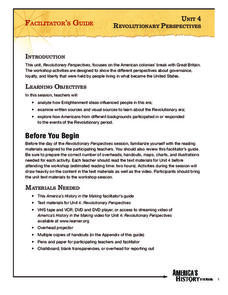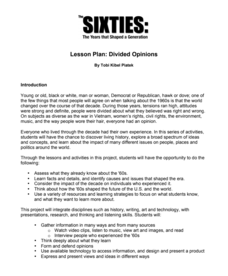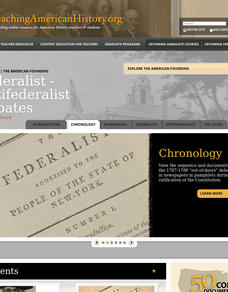US House of Representatives
Congresswomen in an Age of National Crises, 1935–1954
Class members investigate congresswomen and the role these senators and representatives played in congress during the period from 1935–1954.
Annenberg Foundation
Antebellum Reform
Scholars investigate the Antebellum period in the United States in an engaging lesson. Groups analyze technological, religious, economic, and social changes occurring during the time period prior to the Civil War. Using their new...
Annenberg Foundation
Revolutionary Perspectives
Life, liberty, and the pursuit of happiness. Learners go to the heart of the causes of the American Revolution. Examining political cartoons, Enlightenment documents, and firsthand accounts, they present their ideas and reflective...
Annenberg Foundation
Colonial Designs
The adventures of the New World came at a cost for Native Americans. Scholars investigate the economic side of settling the European colonies. Using video clips, statistical evidence, and primary sources, they create hypotheses and...
PBS
Using Primary Sources: Wide Open Town
A picture speaks a thousand words, no matter how old! Scholars use political cartoons from the era of Prohibition and the Temperance Movement to analyze what, a primary document (in this case, a bootlegger's notebook) is telling them...
Benjamin Franklin Tercentenary
Designing Benjamin Franklin: In Search of a Better World
How do you convey someone’s creativity? Individuals answer the question as they design exhibitions to showcase the intellect and genius of Benjamin Franklin. After conducting research, classmates work in groups to try to capture and...
Benjamin Franklin Tercentenary
Reading the Work of B. Franklin, Printer
Placing Ben Franklin’s ideas about a free press next to those embodied in the First Amendment sheds light on both. Learners interpret and compare two primary sources and then examine them in the light of a contemporary survey about...
New York State Education Department
US History and Government Examination: August 2015
Are your learners feeling a bit jittery about an upcoming American history standardized test? Take a look at a state standardized test to give them additional practice and ease their nerves. Extra practice includes a scaffolded...
Country Music Hall of Fame
Ray Charles and Country Music
Ray Charles used the pain and adversity from his life to influence an entire genre of American music. Learn about the musician's daily life, struggles and success, and powerful musical style with a thorough resource.
PBS
Lesson Plan: Divided Opinions
To gain a more in-depth understanding of the tumultuous 1960s, young historians examine video clips, listen to music, examine images, and interview survivors. Once they have a foundation of information about the period, class members...
Benjamin Franklin Tercentenary
Franklin, Master Diplomat
While many often associate Ben Franklin with his kite electricity experiments, budding historians find out he contributed much more. They discover Franklin's political savvy by examining primary sources in the informative installment of...
Ashbrook Center at Ashland University
Ratification of the Constitution
How difficult was it to get everyone to agree on the contents of the Constitution? Historians analyze the task of the Founding Fathers in creating the United States Constitution. They research a directory of video clips, primary sources,...
Ashbrook Center at Ashland University
Bill of Rights
Do citizens need protection from the federal government? Scholars investigate why the framers of the Constitution created the first 10 amendments and what these amendments mean to citizens of the United States more than 200 years later....
Ashbrook Center at Ashland University
Federalist - Antifederalist Debates
Who should have the power—individual states or the federal government? Scholars research the arguments of the Federalists and Anti-Federalists during the formation of the United States Constitution. Online resources, including a vast...
Ashbrook Center at Ashland University
The Constitutional Convention
Imagine sitting down with representatives of your school to write a new student handbook. What arguments would ensue? How would compromises be made to finish the project? Scholars research the Constitutional Convention using a directory...
Mrs. Robbins' Social Studies Site
The Berlin Blockade
The Berlin Blockade may not take up as much space in the history books as other events of the Cold War, but for the citizens of west Berlin in 1948—and the events to follow between the Soviet Union and the United Stattes—those 318 days...
State Bar of Texas
Grutter v. Bollinger
A university decides not to allow a qualified scholar to enter its institution based on skin and gender—but this case is about a white female? The 2003 Supreme Court case Grutter v. Bollinger lays the foundation for open discussion and...
State Bar of Texas
Edgewood ISD v. Kirby
Have you ever wondered where the money comes from to pay for your school, teachers, supplies, and building? The 1989 Supreme Court case Edgewood ISD v. Kirby lays a framework for open discussion on the funding of public schools. Using a...
State Bar of Texas
Tinker v. Des Moines
Freedom of speech allows anyone, even those in school, to say and do what they feel—right? The 1969 Supreme Court case Tinker v. Des Moines serves as the backdrop for a study on First Amendment rights. Scholars use a short video along...
State Bar of Texas
Gideon v. Wainwright
How does a trial begin without a lawyer for the defendant? The 1963 Supreme Court case Gideon v. Wainwright serves as the backdrop for the study of the rights of the accused. Scholars use a short video along with paired discussion and...
State Bar of Texas
Mapp v. Ohio
Do you have a search warrant? Scholars investigate the concept of illegal search and seizure through the eyes of the Supreme Court case Mapp v. Ohio. A short video clip along with paired group work opens discussion on the concept of how...
State Bar of Texas
Brown v. Board of Education
You walk each day over 20 blocks to school as a 9-year old because the color of your skin does not allow you to attend a school in your own neighborhood. Scholars use the 1954 Supreme Court case Brown v. Board of Education to investigate...
State Bar of Texas
Mendez v. Westminster and Delgado v. Bastrop ISD
You arrive at school only to be told you have no place there. Scholars research the Supreme Court cases Mendez v. Westminster and Delgado v. Bastrop ISD, both dealing with school segregation. Two short video clips as well as small group...
Independence Hall Association
American History: From Pre-Columbian to the New Millennium
Need an online resource to supplement the paper textbook in your classroom? An all-encompassing website covers historical events throughout the last half of the second millenium, leading right up to the third. From the pre-Columbian...

























